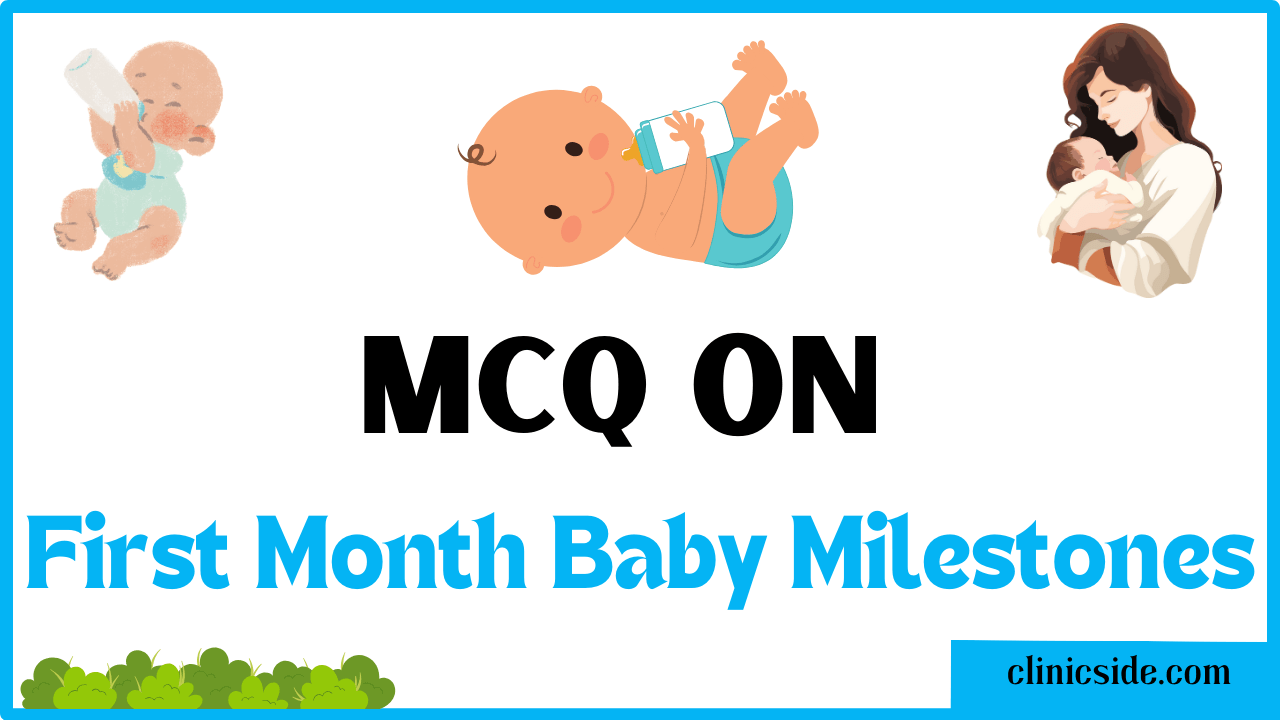Quiz
Available options: 1 to 20
Pre-Quiz Discussion:
Introduction Baby’s Growth and Development: The First Month
During the first month of a baby’s life, an incredible journey of growth and development begins. This period is marked by significant changes in the baby’s physical, cognitive, and emotional capabilities. Understanding these developmental milestones is essential for parents and caregivers to ensure the baby’s well-being and provide appropriate support.
Physical Development
- Weight and Size: Newborns typically lose a small amount of their birth weight in the first week but start gaining it back by the end of the first month. On average, a baby should gain 1.5 to 2 pounds during this time.
- Reflexes: Babies are born with various reflexes, including the rooting reflex (turning their head toward touch), the sucking reflex, and the grasp reflex. These reflexes help them with feeding and exploration.
- Sensory Development: In the first month, a baby’s sensory organs, such as vision and hearing, are still developing. They are most attracted to high-contrast patterns and sounds.
Cognitive Development
- Awareness: Newborns begin to show signs of awareness. They may follow a moving object with their eyes and respond to simple sounds.
- Sleep Patterns: Babies at this age sleep for most of the day, with their sleep-wake cycle not yet established. They wake up for feeding and short periods of alertness.
Social and Emotional Development
- Bonding: Babies start to form strong emotional bonds with their primary caregivers, typically their parents. Skin-to-skin contact, cuddling, and talking to the baby help foster this connection.
- Crying and Communication: Crying is the primary means of communication for newborns. They cry to express hunger, discomfort, or the need for attention. As time passes, caregivers become adept at deciphering and understanding these signals.
Feeding and Nutrition
- Breastfeeding or Formula: Babies should be fed breast milk or formula every 2-3 hours. Breastfeeding also supports bonding between the baby and the mother.
- Weight Gain: Frequent feeding is crucial to ensure the baby is gaining weight as expected.
Challenges and Concerns
- Jaundice: Some newborns may develop jaundice, a condition characterized by yellowing of the skin and eyes. It usually resolves on its own but may require medical attention in severe cases.
- Colic: Colic, or excessive crying and fussiness, can be challenging for both parents and the baby. Strategies for soothing the baby may be needed.
Regular Pediatric Check-ups
It is vital to schedule regular pediatric check-ups during the first month. These visits ensure that the baby is healthy and meeting developmental milestones. Your healthcare provider is available to help with any concerns that may arise.
Summary:
The first month of a baby’s life is a period of remarkable growth and development. Understanding these changes and providing a loving and nurturing environment is essential for their well-being. As the baby continues to grow, parents and caregivers will witness many more exciting milestones and transformations in the months and years to come.
Test Guidelines and Time Limit:
Guidelines for Maximizing Your Quiz Experience:
Read and Understand:
Carefully read each question related to Baby’s Growth and Development and ensure you have a clear understanding of the concepts before selecting your answer. This will help you make informed choices and avoid misconceptions.
Choose the Best Answer:
Evaluate all available options before selecting the one that aligns best with your knowledge of Baby’s Growth and Development. Strive for accuracy and relevance in your responses.
Time Management:
The quiz has a time limit based on the number of questions you choose. Allocate 45 seconds per question. Manage your time wisely to complete all questions within the allotted time.
Efficient time management increases your likelihood of successfully completing the quiz and submitting your answers within the designated timeframe. Best of luck!






